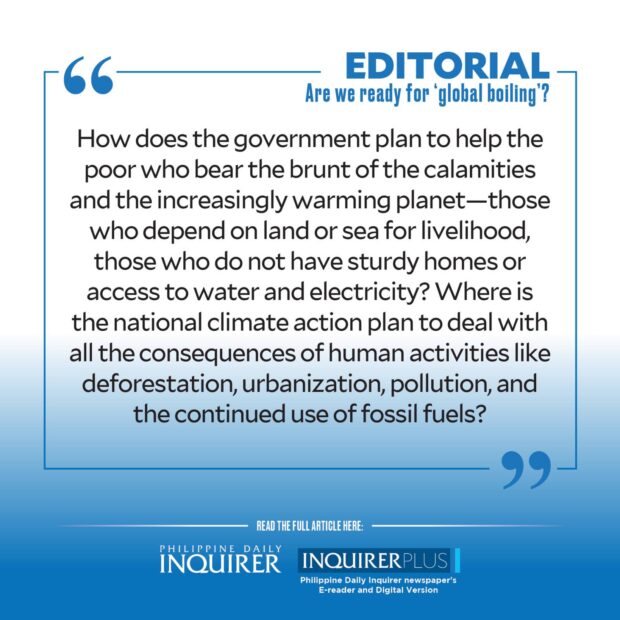Are we ready for ‘global boiling’?
The United Nations (UN) warned this week that the era of global warming has ended and the era of “global boiling” has arrived as global temperatures exceeded the 1.5 degree Celsius threshold above the preindustrial level in the first and third week of this month.
Europe, North America, and Asia have been hit by heatwaves, the Philippines included. The country recorded the hottest day this month on July 6 with a temperature of 37 degrees in Port Area, Manila. Many Filipinos’ soaring electricity bills over the past months bear witness to the unbearable heat even though “habagat” (southwest monsoon season) and Typhoons “Dodong” and “Egay” this month helped bring down high temperatures a notch and brought much-needed rains to replenish drying dams and scorched farms. On the other hand, this extremely hot and cold weather pattern has also brought peril to agriculture and misery to poor, vulnerable sectors.
Article continues after this advertisement“Extreme weather is becoming the new normal. All countries must respond and protect their people from the searing heat, fatal floods, storms, droughts, and raging fires that result,” said UN secretary general António Guterres in a press conference on climate last Thursday.
In his second State of the Nation Address (Sona), President Marcos pronounced climate change as “an important criterion” in the government’s national policies and called on all sectors of government and society to adopt the circular economy, which calls for maximizing the use of resources and minimizing waste. “We remain committed to global decarbonization goals, and the reduction of our carbon footprint. We preserve and protect the treasure that is our forests. Their value to the environment, to the ecology, and the economy is incalculable,’’ Mr. Marcos said.
The President rattled off several priority legislative measures including an excise tax on single-use plastic and amendments to the Fisheries Code. There was, however, no update on his administration’s National Climate Change Action Plan or a push for the proposed climate accountability law, backed by advocates, that seeks to establish a reporting facility for businesses’ greenhouse gas emissions.
Article continues after this advertisementProtect Verde Island Passage, a coalition of communities and environmentalists advocating for the protection of the vital marine corridor, also noted how there was no mention of the Oriental Mindoro oil spill which has impacted the country’s marine resources and thousands who depend on them.
Other sectors already experiencing the impact of extreme weather events must also have questions on how the government can help them, moving forward:
Farmers who are at their wits’ end trying to cope with the erratic weather changes (Benguet’s strawberry farmers are the latest casualties) and struggling to grow their crops, sell them at fair market prices, pay off loans, put food not only on every Filipino household’s table but their own, too.
Fishermen who have seen a decrease in their catch due to rising temperatures and sea levels, ocean acidification, and damaged marine ecosystems, among others.
Communities who are directly in harm’s way: Those who live in increasingly deforested areas and along shorelines that are already being eaten away by the sea level rise.Children whose health is increasingly threatened by infectious diseases worsened by heat waves, heavy rains, or droughts.
Generally, every Filipino affected, directly or indirectly, by extreme weather conditions: students who need to attend online classes during bad weather but do not have stable internet connection or electricity; office workers who must brave flooded streets and a broken transport system in order to get home; wage earners such as those in construction or delivery who lose income during heatwaves or typhoons.
It is of utmost importance for the government to present clear and comprehensive programs to implement the President’s broad environment and climate change policy mentioned at the Sona. How does the government plan to help the poor who bear the brunt of the calamities and the increasingly warming planet—those who depend on land or sea for livelihood, those who do not have sturdy homes or access to water and electricity? Where is the national climate action plan to deal with all the consequences of human activities like deforestation, urbanization, pollution, and the continued use of fossil fuels?
According to the President, the Philippines is sometimes “over-prepared” for natural disasters. But the suffering of thousands displaced each year by typhoons, floods, and landslides, as well as the death toll from disaster-related incidents belie that statement. Beyond preparations for disaster response and relief operations, the government must lay down and implement concrete policies that would mitigate the harmful and increasingly catastrophic effects not only of these natural disasters but the new phenomenon of extreme heat.

















